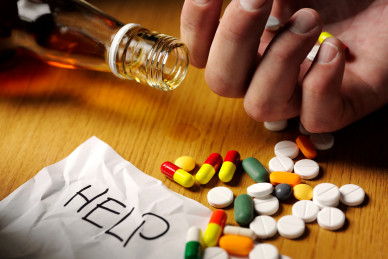Substance and Drug Abuse Treatment, Recovery and Assistance
It may be difficult to imagine yourself reach a gold of sobriety when you are struggling with drug addiction. You must continue to remind yourself though that recovers from drug addiction it never out of reach, no matter how deep into addiction or hopeless you feel. All that is needed is the right care, treatment and support to overcome it through addressing the root cause. Never loose faith – even if you have attempted recovery before and failed. Recovery can be a long road that resembles a roller coaster; there are ups and downs but by admitting you have a problem and wanting to make a different, you are quickly on your way to recovery.
Step 1 for Drug Addiction Treatment: Be Proactive
One of the most difficult steps to take towards treatment is being proactive and deciding to make a change in your life. It is very common that people feel conflicted when thinking about giving up drugs, even when you totally understand the problems it causes. With everything in life, change is difficult and being proactive towards sobriety means there are several things you need to change, including:
- How you feel towards yourself
- The way you overcome stress
- Who you accept into your life
- What you do in your down time
All of theses changed can be difficult and may take some time to understand. It is perfectly normal if you are confused about what lies ahead but being proactive towards treatment is the first step. These tips below can help you get started in thinking about treatment:
- Create a journal of your drug abuse, including the dosage and how often you are using it.
- Make a list of the positives and negatives of quitting in addition to the benefits and cost of your continued abuse.
- Think about all of the most important people and things in your life and the impact it will make when you are fully treated.
- Have a conversation with someone you trust. Ask them what they think or feel about your drug use.
- Consider what may be stopping you from making a change.
5 Steps To Being Proactive
- Continue to remind yourself why you want to change.
- Consider your attempts you have made, if any, with quitting. What worked? What failed?
- Create objectives, measurable goals, such as a goal date or limiting your drug abuse.
- Get rid of any trigger objects that may remind you about drugs that are at home or workplace.
- Announce to family and friends that you are on the road to recover and ask for their guidance and support.
Step 2 for Drug Addiction Treatment: Understand Recovery Options
The moment you have decided to being the road to recovery, you need to explore and understand all the recovery options available. As you begin to seek out recovery options, keep these thoughts in mind:
- There is no quick fix or one treatment that works for everyone. When you are in search for different options, remember that everyone has different needs that need to be met. No matter which option you choose, make sure it is a customizable approach that caters to your situation.
- Recovery needs to address all aspects of your life, not just drug abuse. When drug abuse happens it affects every aspect of your life including your health, relationships, career and mental well-being. In order to fully recover you must address every aspect and make a healthy change to understand what turned you to drug abuse.
- Committing and continuing are essential. Recovery is not easy or quick. Typically the longer you have been abusing drugs; the longer the treatment will take you. No matter how long or deep into drug abuse you are, you must commit to making a difference and continue that commitment.
- Understand there are a plethora of places to turn ask for assistance. Every individual may not need supervise detox or a long stay at a recovery center. Depending on your age, drug abuse past and many other things, there is a specific drug recovery program for you.
As you are in search for assistance with drug abuse treatment you will most likely need treatment of other psychological and physical issues that may have arrived. Make sure when you choose a treatment program that they can assist you with all your needs.
Step 3 for Drug Addiction Treatment: Ask For Help
Everyone needs help, no matter the circumstances. Whichever path you choose to recovery, having a solid backbone with support is imperative. The more supportive and loving influential people you have, the easier it will be to reach full recovery. Treatment is not an easy thing but when you have a supportive system you can o to for guidance, encouragement and someone to talk to, it may seem easier.
- Have friends and family nearby. Your friends and family want nothing more but for you to be treated so most likely they will be there for you every step of the way.
- Create a circle of sober people. When being social make sure that the people around you are living the lifestyle you are seeking. That means stay away from any social gathering that involves drugs of any kind. This may include a church, civic organization, volunteer work or community events.
- Consider living at a sober living house. A sober living house can provide you with an environment that is drug free and with support that is readily available 24/7 for anything you need.
- Attend all meetings with treatment groups. Joining a treatment group and attending each meeting will help you understand that you are not alone and learn how other people are healing.
Step 4 for Drug Addiction Treatment: Teach yourself how to deal with stress
After you have been treated with drug addiction, you still need to understand how you will deal with stress. Many times people begin using drugs to escape reality when stressed that may involve painful emotions. When you have been treated, the negative cogitations that created your drug use will resurface and you must know how to overcome them.
Stress, loneliness, anxiety and other negative emotions wil still be around, even after you have recovers. But you will be in a better place than when you were with your drug abuse, just make sure to understand when these emotions happen and how to take care of them
There are many ways to deal with stress rather than abusing drugs. It may feel somewhat off but once you get into the groove of things it will become second nature. Here are a few things you can do to relieve stress:
- Go to the gym and exercise. This will release endorphins, which relieves stress and helps with your mental stability.
- Take a step into the sun and enjoy the warmth and fresh air.
- Meditate or do some yoga.
- Have some fun with a pet like your dog, cat, bird or fish.
- Listen to some calming tunes.
- Enjoy a scented candle.
- Savor your favorite scent such as flowers, coffee beans or a scent that reminds you of a happy thought.
- Imagine you are at a relaxing place such as a beach, the mountains or relive a fond memory.
- Enjoy a cup of coffee or tea.
- Soak in the shower or tub with low lighting.
Step 5 for Drug Addiction Treatment: Leave all triggers and cravings behind you
When you are trying to reach full sobriety there will be many triggers and cravings that will arise in your everyday life. Sometimes they may be mental, physical or simply a situation or object the reminds you of drug use. Make a conscious effort to leave all of those cravings and triggers behind you in the past. Here are several common triggers and craving situations:
- Being with your drug friends. Many times you may have done drugs with a drug buddy and they are still abusing drugs. Do not surround yourself with those people and stay away from any situation that me involve them.
- Stay away from clubs and bars, even if you do not have a history of alcohol abuse. Many time a bar or club will trigger an old memory that may have involved drugs and you may quickly relapse.
- Do not hide your drug history when receiving medical attention. If you are receiving dental treatment or visiting the doctor, be real with them and tell them your past history with drug use. Never feel that you need to hide it because they may need to customize your medical attention.
- Take prescribed drugs with caution. If you think taking a prescribed drug may make you relapse, make sure to address that to your physician and most likely there are alternatives.
Step 6 for Drug Addiction Treatment: Creating a drug-free life
Create a drug-free lifestyle and environment through different things to become involved with in your everyday life. Here are a few things you may want to consider when you are creating your new life:
- Have a new hobby
- Adopt a pet
- Become involved with the community
- Join a club or organization
- Create meaningful goals and work towards them daily
- Become health conscious through exercise and eating habits
Step 7 for Drug Addiction treatment: Never let relapse interfere
Relapse is one of the most common parts of any drug users treatment. You may quickly become frustrated or discouraged if relapse happens, but this can be a time to validate your treatment process and understand the mistakes you made.
Always take into consideration that relapse does not mean you failed at treatment. Do not give into the relapse and give up to your old ways. Make sure to call a treatment center, support system, therapist or go to a recovery meeting. Once you have become completely sober again, look back at what created the craving or the trigger that created the relapse and think about what you could have done differently. You can either choose to go back down the wrong path again or created an even stronger commitment towards sobriety.







